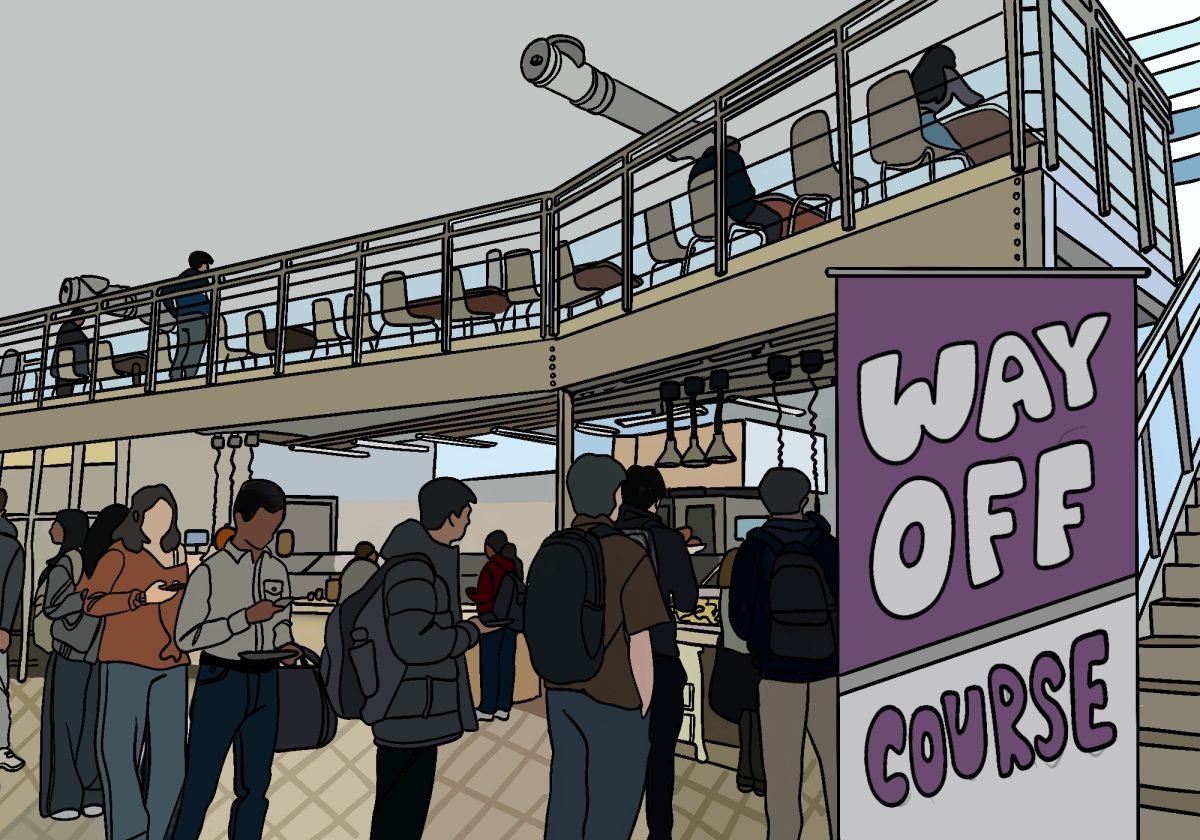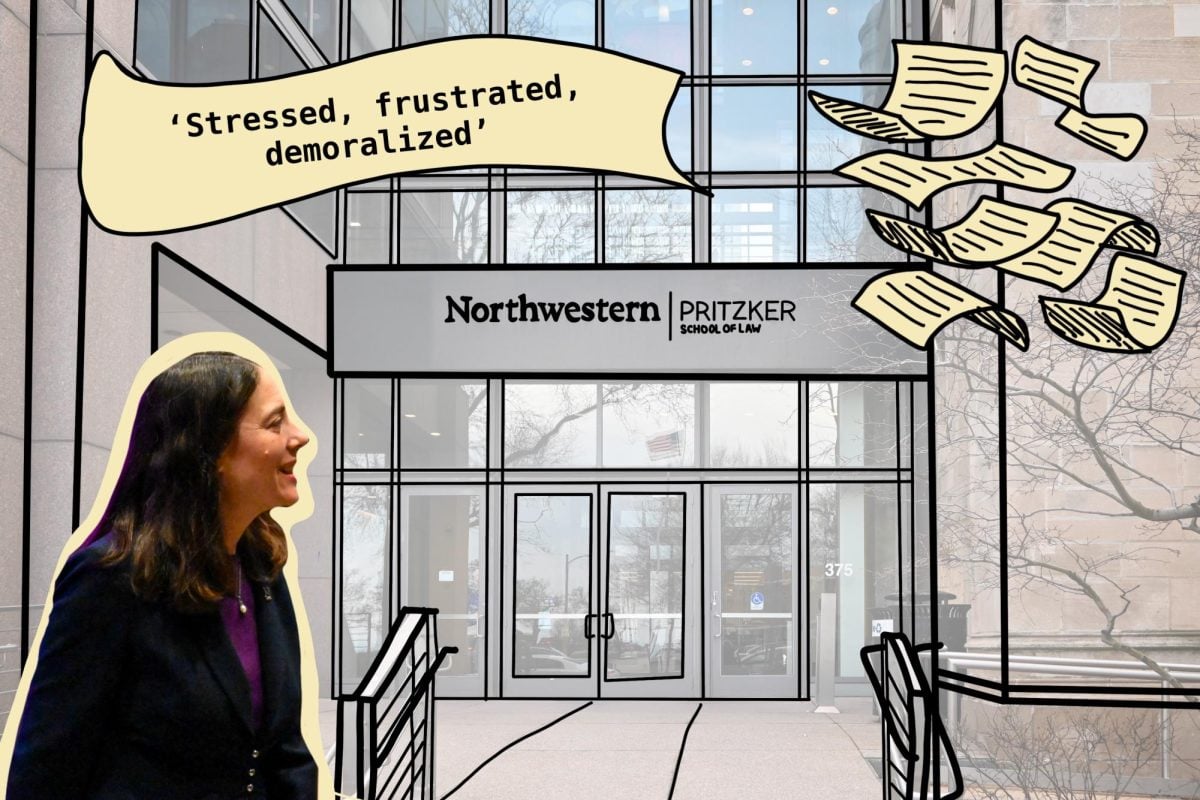Just over a month before she graduated from Northwestern, Emily Song (McCormick ’24) told her professor that Scott Simpson — a professional hired to help students manufacture projects in the Segal Design Institute shop — was “unfit” to work in a learning environment.
Song had previously reported Simpson for his “disrespectful” behavior toward her, referring to several incidents with him during her sophomore year. After another negative interaction with Simpson in February, she lodged a complaint against him again.
“I don’t enjoy spending time in the shop anymore,” she wrote in a Feb. 19 email to her professor. “I look over my shoulder, making sure Scott is not around me.”
Four days later, she met with Segal administrators to discuss her concerns about Simpson. That same week, seven other students lodged similar complaints against him.
And, on Feb. 25, Song and four other McCormick seniors launched a petition alleging a “deeply problematic culture” at the shop. The petition calls for new accountability mechanisms and feedback systems in the shop and an immediate investigation into Simpson’s behavior. As of May 21, it has received 114 signatures.
Despite several complaints to Segal and University administrators and a temporary absence from his role, Simpson made appearances at the Ford Center following his removal from the shop floor in late February. He returned to his role on April 23.
Even as the University promises to implement safeguards to prevent similar behavior, several students question administrators’ ability and desire to hold Simpson accountable for his conduct.
“If students don’t shine a third-party spotlight on the behavior and the conditions in the shop, from individuals or the culture itself, there’s nowhere in the administrative chain that will allow for such scrutiny,” Song said.
‘Try and speak English better’
Aside from Song, several students told The Daily that Simpson has a tendency to exhibit problematic behavior toward women, people of color and those with accents.
 One shop trainer (McCormick ’24), who has worked in the shop for about two years, said he observed Simpson treating students differently based on their race and gender. The trainer, one of several students who work closely with shop professionals like Simpson, spoke under the condition of anonymity, fearing retaliation.
One shop trainer (McCormick ’24), who has worked in the shop for about two years, said he observed Simpson treating students differently based on their race and gender. The trainer, one of several students who work closely with shop professionals like Simpson, spoke under the condition of anonymity, fearing retaliation.
He described Simpson as giving white-appearing men more generous feedback. White-appearing women, he said, often had to “act dumb and innocent” to get a positive response from Simpson.
“Everyone else, it’s kind of a gamble,” he said. “Especially if you’re darker skinned. Then, it’s a little bit more stressful.”
The Daily requested an interview with Simpson and followed up with a detailed list of questions about students’ allegations. Simpson did not respond to either request for comment prior to publication.
The shop trainer said that he has seen Simpson become frustrated with people with accents, especially when they ask for assistance on the water jet, a machine that uses a high-pressure stream to cut materials.
Since both undergraduate and graduate students from different backgrounds use the machine, the trainer said, it is common for users to not speak English as their first language.
“When he gets really impatient like he did in the fall, he’ll just say, ‘Stop. You need to do this, remember what we talked about,’” the trainer said. “He doesn’t give them a chance to talk.”
The trainer also said Simpson once told him that “I love all people” but that people with accents should “try and speak English better.”
The trainer estimated that he has heard about 40 stories from students about Simpson’s behavior, ranging from microaggressions to confrontations with students.
Song’s first negative interaction with Simpson this year was followed by a second on Feb. 23. Song went to the shop and asked Simpson for help with the water jet for her 300-level design project.
Simpson told Song to make an appointment for later in the week. But a half hour later, Song said, she saw a shop trainer she knew who offered to help her at 4 p.m. that day. The shop trainer said they told Simpson of the arrangement.
When Song returned to the shop for her appointment with the trainer, Simpson stopped her before she could enter the room where the water jet was located, she said. According to Song, Simpson told her that the machine was no longer available and that she shouldn’t have gone “behind his back” for help.
Song said she tried to defend herself, explaining to Simpson that the trainer initiated the appointment. However, Simpson told Song he does not “talk to mad people” and walked away, she said.
According to Song, the trainer caught this part of the conversation and assured her that he would speak to Simpson for her.
While the trainer later returned to tell her that Simpson was “sorry” for his conduct, Song said she felt disrespected by Simpson’s unwillingness to apologize to her personally.
Song then encountered Simpson by the water jet, where he apologized to her. In response, Song told him that yelling was not a productive way to speak to students, she said.
Simpson replied that he was not yelling — Song was. When she denied this, Simpson interrupted her, Song said.
Simpson reiterated that he doesn’t “talk to angry people,” Song wrote in a statement to The Daily.
The Daily spoke to another student who witnessed Song’s interaction with Simpson and corroborated her account.
Immediately after her confrontation with Simpson, Song went to Segal’s administrative offices to report the incident. She confided in McCormick Prof. Kim Hoffmann, Segal’s Design Education and Strategic Initiatives lead, who she wrote was “very sympathetic” to her situation.
Song launched the petition shortly after. It had been in the works prior to her second negative interaction with Simpson in February, she said. Within a day, the petition garnered nearly 80 signatures.
One of the petition’s demands is that CTECs — the University’s course and teacher evaluation tool — be extended to evaluate shop staff. The petitioners also demanded that an immediate investigation into Simpson’s behavior be launched, with findings reported to Segal and McCormick students.
“Some of the shop staff have forgotten they work in a teaching environment,” the petitioners wrote. “We do NOT deserve to be treated the way we have for asking for help.”
Dueling petitions
Since the launch of Song’s petition, some former NU students have come to Simpson’s defense, highlighting their positive experiences under his tutelage.
Nearly two weeks after the McCormick seniors launched their petition, Wojciech Stojko (McCormick ’15, ’16) started a Change.org counterpetition on March 8 called “Support for the continued safe existence of the Segal Prototyping and Fabrication Lab.”
However, Song said her petition’s aim was not to claim Simpson is “indiscriminately mean” to everyone.
Song highlighted that the “narrative” of alumni like Stojko — who she noted were mostly white and male, with the most recent graduation date being 2019 — can exist alongside the experiences of her and others.
“What we’re trying to say is that it’s unprofessional for teaching staff to extend care, attention (and) quality teaching only to those that they choose and not the general public,” Song said. 
Stojko’s petition calls for empowering shop professionals’ ability to hold “dangerous shop users” accountable by writing up, recording and ejecting students determined to be exhibiting “unsafe behavior.” The petition has 93 signatures as of May 21.
“We had mentors such as Scott Simpson to teach us how to creatively, effectively, and most importantly safely express our ideas through meaningful prototyping work,” the petition reads.
The petition alleges that students’ respect for the machinery has decreased in recent years. The petition also said current students were “erroneously confident” in their ability to use the machines to the point that they think they “know better than seasoned professionals.”
As an employee for the Ford Motor Company, Stojko added, he sometimes comes to the shop for student recruitment and to teach guest classes.
Song’s petition quickly circulated within a network of former shop student workers, Stojko told The Daily in a statement.
Petitioners also claimed there had been a recent “vilification” of Simpson in Song’s petition. It called claims of Simpson yelling “laughable” and ignorant of his recent hearing loss.
Simpson did not respond to a request for comment on the hearing loss.
In a Facebook message obtained by The Daily, Simpson thanked one alumnus for his support with the counterpetition and asked him to reach out to others in hopes of “blowing up” Song’s petition.
“It’s a super difficult position to be in charge of everything in the shop,” Simpson wrote. “Especially when you have to worry that anything (you) do or say can offend someone.”
In a message to the listserv of a student group that regularly uses the shop, sharing the Facebook exchange, the alumnus said he has been messaging Simpson and assured him that the student group “has his back.”
Simpson did not respond to a request for comment on the message or its contents.
Song said students who are willing to learn should have their concerns heard regardless of skill level or shop experience.
Song said in her experience, she has seen Simpson cultivate an “in-group” of selected students that he bonds with through “divulging personal information” and complaining about faculty and other shop users.
In discussions with administrators, Song said, both Hoffmann and Segal Executive Director Greg Holderfield remained sympathetic to her situation.
The Daily reached out to Holderfield and Hoffmann through NU spokespersons but received no comment on a list of questions.
“They repeatedly assure me that the counterpetition is nothing to worry about as all it does is it illustrates the in-group/out-group culture in the shop,” Song wrote in a statement to The Daily.
‘Environment of a dictatorship’
When one McCormick senior and petition writer asked Simpson for help on her 300-level design course final in Fall Quarter, she said Simpson told her the questions were so “basic” that it was “embarrassing” she was even asking. It was her first time operating the Computer Numerical Control mills, machines that could cause injury if misused.
“He told me that if I didn’t know how to do this one thing that I had no business being in the shop,” she said. “I just remember (his comments) making such a deep impact on me because it’s already an insecurity I had as somebody that didn’t have as much shop experience.”
 As the incidents piled up, students at the shop found themselves increasingly avoiding Simpson while working. Multiple students told The Daily that Simpson’s presence created a stressful and fearful experience for those working alongside him.
As the incidents piled up, students at the shop found themselves increasingly avoiding Simpson while working. Multiple students told The Daily that Simpson’s presence created a stressful and fearful experience for those working alongside him.
“I wanted to do something cool, and I was really excited, and that just completely ruined the atmosphere for me,” the McCormick senior said about Simpson’s comments on her work. “(It) just made me feel so uncomfortable being in the shop and again — just so tense.”
She also recalled “trying to be frozen” with a female friend when Simpson would walk past them while working on the CNC mills for another design class. She said Simpson facilitated an “unsupportive environment” that intimidated them.
“You (could) just feel the atmosphere shift when Scott walked past us,” she said. “Because we’re just hanging out, machining, and then Scott walked past us. We both grow quiet.”
She added that the pair was scared Simpson would offer unsolicited comments on their projects, so they would stop working until he walked away. As a result, the student said they would rather wait 15 to 20 minutes for another shop professional to be available instead of asking Simpson for help.
Former shop trainers have also observed several other students avoiding Simpson. McCormick senior and former shop trainer Lawrence Chang said community members have a “collective awareness” that Simpson’s demeanor toward students can be “disrespectful or demeaning.”
One former graduate student (McCormick ’24) recalled a time when Simpson turned off a machine while she was midway through using it, telling her that her hair was not “all the way up” — it was in a ponytail instead of a bun.
“It was just kind of one of those things where it’s not a fireable offense, but it’s creating this environment of a dictatorship,” she said. “It’s like, ‘What I say goes.’”
After at least eight reports and the release of the McCormick students’ petition, Simpson was removed from the shop floor on Feb. 26. According to some who worked there, the environment noticeably changed.
“He was out of Ford (Center) for the rest of Winter Quarter. Everything felt very calm. Everything felt very relaxed,” said a former trainer who had worked at the shop for about two years. “It seemed like students were like, ‘OK, yeah, I can be here. I don’t have to worry about Scott.’”
A maze of accountability
Simpson didn’t remain out of sight for long. A week after being removed from the shop floor, he returned to a student-facing position in a research lab in the Ford Center’s basement, a floor below the shop.
In an email that same day, Greg Holderfield — one of the Segal administrators — encouraged Song to pursue formal pathways like the University’s Office for Civil Rights and Title IX Compliance for her complaints.
That day, Song heard from friends that Simpson had returned to the building. Fearful of running into him, Song inquired about Simpson’s appearance to Hoffmann — with whom she lodged her second complaint this year — and Holderfield the next day.
In an email obtained by The Daily, Holderfield replied that Simpson’s appearance “was not expected or understood.” In a separate email, Hoffmann told Song that there was a “disconnect” regarding Simpson’s work arrangements that week.
University spokespersons and Simpson did not comment on the nature of his absence from the shop floor.
Despite faculty members’ confusion and sympathy, Segal administrators told Song that there was little the faculty could do. According to Song, administrators told her “they are unable to investigate Scott or hold Scott accountable in any truly meaningful way.” Song said she was told investigations, hiring and employment termination policies fall under the jurisdiction of NU’s Office of Human Resources.
“Employment and ‘investigations’ are a complicated matter,” Holderfield wrote to Song the same day. “(HR) must be involved — this is not a faculty(-led) process.”
Holderfield told Song that Segal administrators had spoken with HR on the matter and added they were “aggressively working” to address her concerns with HR.
University spokesperson Erin Karter wrote in a statement to The Daily that the Segal leadership team was “made aware of student concerns regarding the prototyping lab and actively worked with University partners to investigate those concerns, address any issues, and continue to improve the culture.”
Karter said that, when issues arise, HR investigates complaints about staff members in partnership with school leadership, the relevant school’s HR administrators and, if relevant, “other University offices.” Karter did not comment on whether there was an investigation into Simpson’s conduct specifically, citing a University policy of confidentiality on personnel matters.
On March 6, Holderfield wrote an email to Song that said Simpson had been reassigned to a project that did not involve student-facing responsibilities.
“Scott will not be in Ford (Center) for the remainder of the quarter,” he wrote. “Next steps are developing and cannot be shared at this time. More to come.”
Meanwhile, Song prepared to bolster her complaint. The next day, she verified the NU affiliation of more than 90 of the petition’s signatories through the University’s online directory at Hoffmann’s request. Song also opened a form for students to submit anonymized or public statements about their experiences in the shop, sending all nine responses the form collected to Hoffmann later that same day.
When Song asked how she could be protected from retribution, she said both Holderfield and Hoffmann replied that they were unsure. According to Song, Hoffmann and Holderfield both said it was their first time dealing with the issue and that they did not know how to identify retaliation or protect Song from it.
Hoffmann and Holderfield, contacted by The Daily through University spokespersons, did not respond to a request for comment.
‘Barely a slap on the wrist’: Simpson returns
For the next month and a half, Song said, Simpson wasn’t working with students, but she hadn’t heard anything about the status of an investigation or long-term consequences either.
Some students still felt encouraged by the developments.
 Chang said when he was a shop trainer from March 2021 to April 2022, he considered reporting Simpson’s behavior. Until Song’s petition, he never did. He said he felt reporting Simpson would not change much in the shop.
Chang said when he was a shop trainer from March 2021 to April 2022, he considered reporting Simpson’s behavior. Until Song’s petition, he never did. He said he felt reporting Simpson would not change much in the shop.
“‘What are the actual tangible things you could do?’ is what I would ask myself, and I felt like there wasn’t much,” Chang said. “I feel like now, (since) we have this petition Emily started, the ball is rolling.”
But, on April 23, Song received word that Simpson had returned to the shop. Simpson’s return has led some students to question if NU has the ability or even desire to reprimand him.
“We’ve tried all of the official avenues of trying to resolve this situation,” McCormick senior Kevin Chen said. “At this point, I guess that we’ve kind of exhausted the options.”
The former shop trainer said after Simpson returned from absence, he observed him “dialing back” his behavior.
But he added that Simpson is typically at his worst toward the end of quarters — when deadlines pile up and pressure mounts — and that it remains to be seen if this behavior returns.
“Administration is not gonna do s–t,” he said. “Nothing’s going to happen because the University needs students that go directly to HR to file a formal complaint, and that removes any source of anonymity.”
The former graduate student — whom Simpson confronted about her hair — described his absence as “barely a slap on the wrist,” especially given his return to the shop.
“He shows his best side to (supervisors) to get what he wants, and that is to remain in the shop,” she said.
‘This is how it is’
It’s been more than two years since Simpson’s first altercation with Song, during Winter Quarter 2022.
One day that quarter, when Simpson was available, she said she asked for general advice on a project she was working on at the time for a research lab.
When she asked him for advice, Song recalled Simpson raising his voice at her and saying students with research should not be working in the shop. At the time, Song was already a shop trainer with her photo on the lab’s wall alongside other trainers.
Song said she didn’t want to argue with Simpson, especially in front of other students. So, she told Simpson she understood and went to leave until he stopped her.
“He then walks up to me again and says, ‘I’m sorry if I hurt your feelings, but this is how it is,’” she wrote in a statement to The Daily.
At the time, there was a portal for shop trainers to anonymously report incidents. She submitted a letter about the experience and put her name on it.
Over the next quarter, Song heard nothing back about the Winter 2022 complaint. She was not in Evanston the following quarter, so she didn’t follow up on it. She also didn’t trust that her letter would be taken seriously, she added.
Part of her Change.org petition calls on the administration to make a more transparent reporting mechanism for design and engineering students working at the shop — one area where administration has made tangible change.
In late March, Hoffmann, Holderfield and McCormick Prof. Michael Peshkin, Segal’s Engineering Education lead, announced mechanisms for institute accountability and feedback following the petitions.
According to the announcement, CTECs for design classes will now feature “Educational Environment” questions. However, not all engineering classes will have these CTECs despite many others requiring students to work in the shop.
Song said this change is not enough to hold Simpson accountable.
Karter told The Daily in a statement that Segal is currently “adding additional mechanisms for feedback that will be available for all courses.”
Song graduated early from NU at the end of Winter Quarter, and many of the petition writers will also leave the University soon.
“To justify their inaction, they use ‘HR’ and ‘safety,’ wrapping the issue so deeply in red tape that I will be waited out before HR makes a decision,” Song wrote in a statement to The Daily.
The McCormick senior and petition writer who Simpson said has “no business being in the shop” said she is “fearful” for the freshmen girls entering McCormick and the shop environment because of his condescending behavior toward women.
“If I had these experiences with Scott when I was working on (Design Thinking and Communication), I don’t know if I would have stayed in McCormick,” she said. “I don’t know if I would have been able to overcome that enough, to stay in an environment that belittles me and makes me feel like I’m way less competent than my male counterparts.”
Though Song has graduated, she occasionally works on personal projects in the shop — where Simpson still remains — ahead of Commencement.
She noted that Segal has implemented “arbitrary rules” in the interim within the shop as a way of guaranteeing safety, like requiring students to wear name tags and stand when operating the CNC machines.
“Segal is currently focusing on enhancing the clarity of communications between students and staff,” Karter wrote in a statement to The Daily.
Song said the new rules are just another way to deflect accountability toward students. She said the real problem lies with “toxic” leadership by shop professionals like Simpson.
“People that they put in the shop are actively bullying students,” she said. “What the administration chooses to do is to focus the blame back on the students, saying students aren’t ‘safe’ enough.”
Email: beavillaflor@u.northwestern.edu
Related Stories:
— Segal directors respond to student allegations on unsafe working environment
— Letter-writing campaign to underrepresented McCormick freshmen builds community
— Christopher Schuh named McCormick School of Engineering Dean








